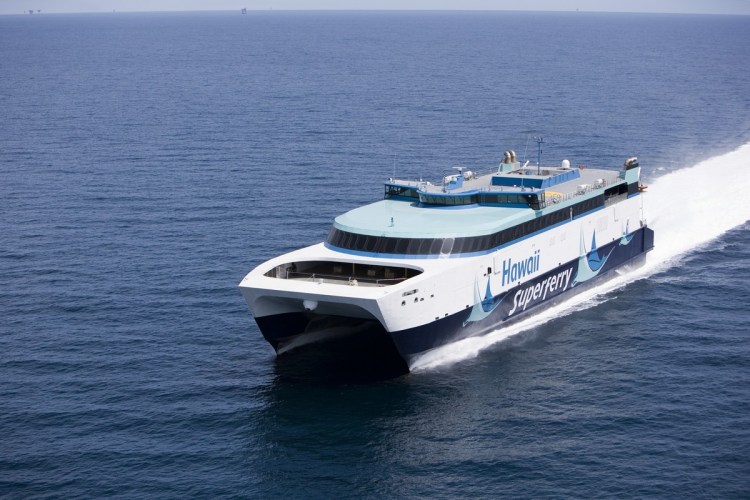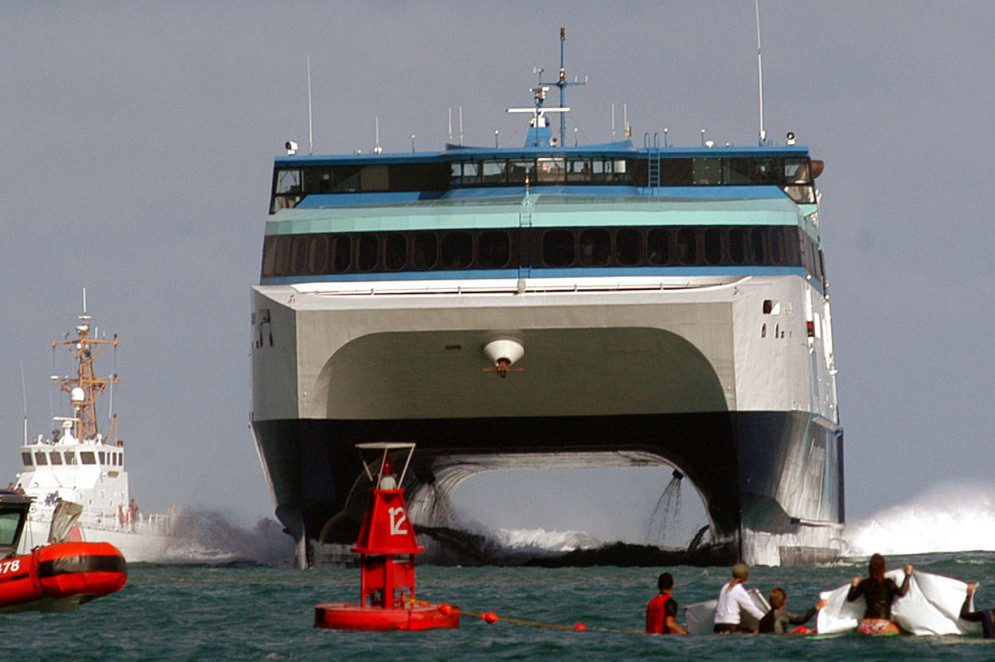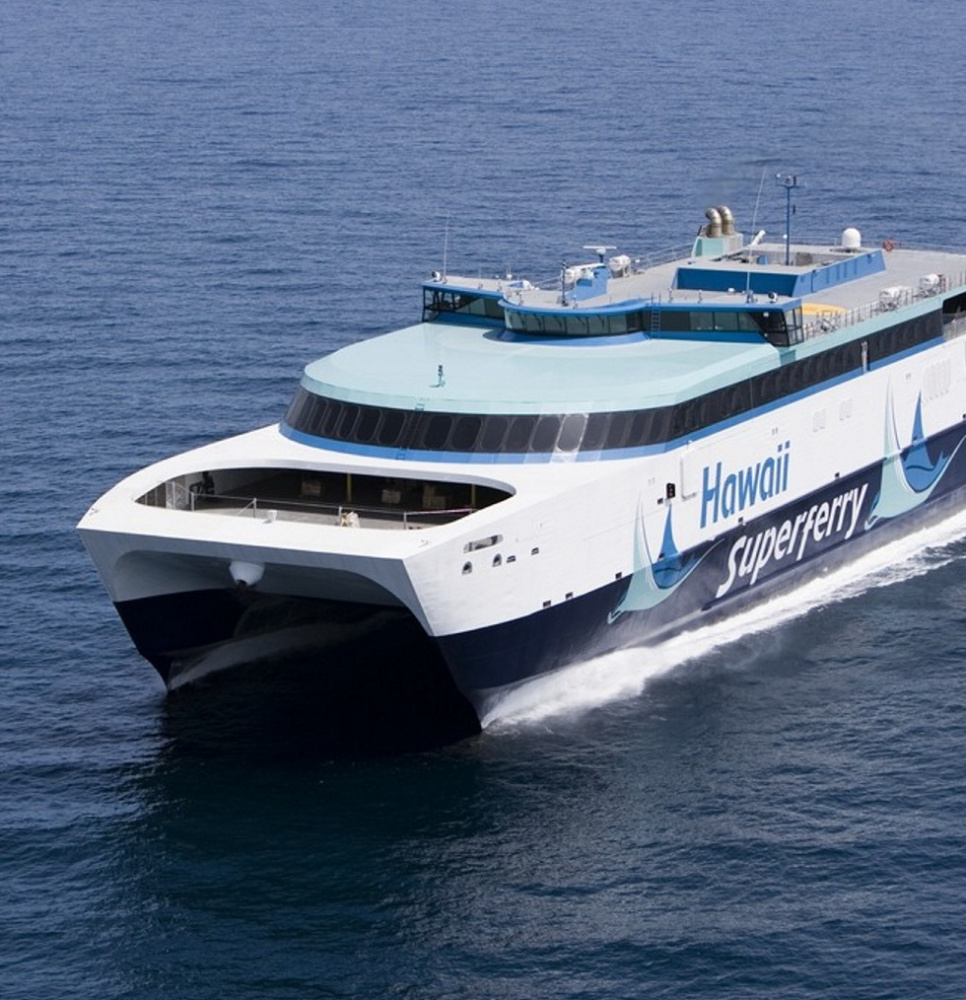A Canadian newspaper has reported that the contractor handling this year’s ferry service between Portland and Yarmouth, Nova Scotia, has found a vessel to replace the failed MV Nova Star that would be similar to its predecessor, The Cat.
The replacement ship is the USNS Puerto Rico, a catamaran about two-thirds the length and nearly twice as fast as the Nova Star, the newspaper reported.
Citing anonymous sources, The Chronicle Herald of Halifax, Nova Scotia, reported Sunday that the replacement operator for Nova Star Cruises – Bay Ferries Ltd., based in Charlottetown, Prince Edward Island – has selected the U.S.-built Puerto Rico and is preparing to announce the news soon.
Brian Taylor, spokesman for the Nova Scotia Department of Transportation and Infrastructure, said he could not confirm what the newspaper reported, but he did say that an announcement was forthcoming.
“As soon as we have the details finalized we’ll release them, but I don’t have a time line,” Taylor said. “Our staff is working on finalizing the details right now.”
Bay Ferries President and CEO Mark MacDonald didn’t return calls seeking comment.
In December, Geoff MacLellan, the province’s minister of transportation, said the government was unable to complete a contract with Bay Ferries until a specific ferry had been secured, because the ship’s design and amenities would determine the service’s expenses and revenues.
However, MacLellan said he was optimistic that Bay Ferries would find a ship, and that the government and Bay Ferries would agree on a contract for this summer. Nova Scotia intends to subsidize the service but has yet to say how much money it will spend.
SPACE FOR COMMERCIAL TRUCKS?
Canadian groups have criticized the provincial government, led by Nova Scotia’s Liberal Party, for failing to complete a deal for continued ferry service. The groups said Monday that they won’t comment on the adequacy of the USNS Puerto Rico until it is officially confirmed.
Angie Zinck, a spokeswoman for the Progressive Conservative Party of Nova Scotia, said one of the big concerns is whether the new ferry would be able to accommodate commercial trucks, specifically tractor-trailers.
According to its specifications, the Puerto Rico is 349 feet long, considerably smaller than the 528-foot-long Nova Star. Its maximum speed is 40 mph, compared with the Nova Star’s 24.6 mph. The catamaran was launched in 2007 by Austal USA and originally was used as a high-speed ferry among the Hawaiian islands. Its current owner is listed as the U.S. Maritime Administration.
Originally sold for $88 million, it can carry up to 866 passengers and 282 cars, and its vehicle decks can be reconfigured to accommodate 20 tractor-trailers or buses and 90 cars. The Nova Star’s capacity was 1,212 passengers and 336 cars and/or up to 38 commercial trucks or buses.
Zinck declined to comment on whether a capacity of 20 commercial trucks would be sufficient.
“I think government should first tell us what boat they have secured before we comment on the specifics of a rumored vessel,” she said via email. “We will continue to work with the local truckers as the government confirms details – but we do believe the first step is for government to tell us what vessel will be in place.”
SMALLER FERRY, FASTER CROSSING
In a Progressive Conservative news release, Brian Reynolds, owner of B. Reynolds Trucking in Port La Tour, Nova Scotia, said he has become increasingly concerned that trucks are not going to be allowed on the ferry.
“This ferry announcement is as important to our industry as it is for the tourism industry,” he said. “If the ferry being considered will not take trucks, we will have a very serious problem in Southwest Nova.”
In a January interview with the trade publication Truck News, Reynolds said he hauls fresh seafood and that getting it to market quickly is essential for his business.
A ferry the size of the Puerto Rico can make the crossing much faster than the 10-hour drive between Portland and Yarmouth. Even on the Nova Star, which took 10 hours to travel between the two ports, Portland city records show that tractor-trailers took 400 trips from May through October of 2014 and 636 trips from June through September 2015.
The Nova Scotia government chose not to renew Nova Star Cruises’ contract for the Portland-to-Yarmouth service for 2016.
Mark Amundsen, president and CEO of Nova Star Cruises, operated the service for two years before the government canceled the contract in October because its vessel, the Nova Star, carried far fewer passengers and cost the government much more money than expected.
HISTORY OF FINANCIAL STRUGGLES
Amundsen predicted the Nova Star would carry 100,000 passengers a season. Instead, it carried 59,000 passengers in 2014, its inaugural season, and 52,000 in its second season, a 12 percent decline.
The province spent 28.5 million Canadian dollars on the service in the Nova Star’s first season. In 2015, the government limited its subsidy to $13 million Canadian, equal to nearly $10 million at current exchange rates.
The service’s financial troubles led a federal court to order the seizure of the Nova Star in October, after several companies complained that they were owed more than $3 million.
Nova Star Cruises paid most of its debts and left Portland Harbor on Dec. 9. Owned by Singapore-based ST Marine, it is now operated by Morocco-based Inter Shipping as a chartered ferry between Tangier, Morocco, and Algeciras, Spain.
Nova Scotia’s government announced Oct. 29 that Bay Ferries was the preferred candidate for the Yarmouth-to-Portland route, which the province sees as essential to its tourism industry.
Bay Ferries operated The Cat, a high-speed ferry between Yarmouth and Portland, until canceling the service on Dec. 18, 2009, after the provincial government refused to continue its subsidy because it was losing too much money.
The Cat was 319 feet long and carried up to 760 passengers and 200 vehicles. In 2011 it was renamed Hai Xia Hao and it now operates as a ferry between Taichung, Taiwan, and Pingtan Island, China.
Beginning with the 2006 and continuing into the 2007 operating seasons, the Nova Scotia government provided an annual subsidy of $1.5 million to Bay Ferries to offset declining passenger revenue and increased fuel costs. The ferry operator had been seeking about $6 million for its 2010 season, which the government rejected, leading to cancellation of the service.
Bay Ferries has a main office in Charlottetown and a smaller office in Halifax. It is a subsidiary of Northumberland Ferries Ltd., also based in Charlottetown. Bay Ferries operates the Fundy Rose, which has daily crossings between Digby, Nova Scotia, and Saint John, New Brunswick.
J. Craig Anderson can be contacted at 791-6390 or at:
Twitter: @jcraiganderson
Copy the Story LinkSend questions/comments to the editors.






Success. Please wait for the page to reload. If the page does not reload within 5 seconds, please refresh the page.
Enter your email and password to access comments.
Hi, to comment on stories you must . This profile is in addition to your subscription and website login.
Already have a commenting profile? .
Invalid username/password.
Please check your email to confirm and complete your registration.
Only subscribers are eligible to post comments. Please subscribe or login first for digital access. Here’s why.
Use the form below to reset your password. When you've submitted your account email, we will send an email with a reset code.